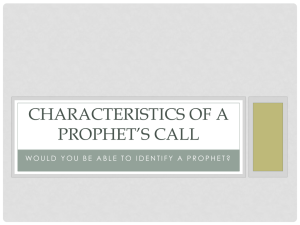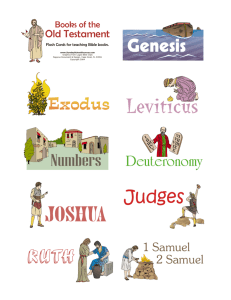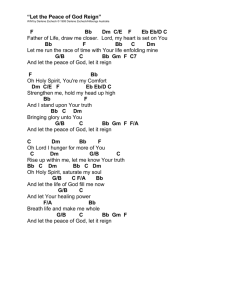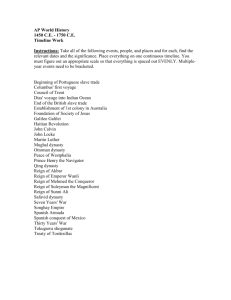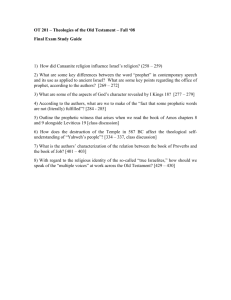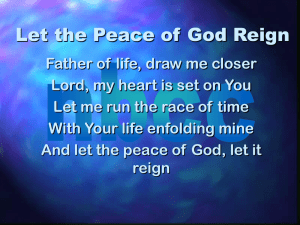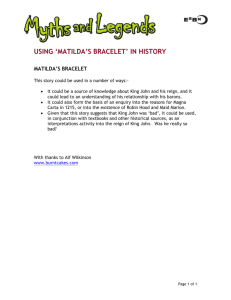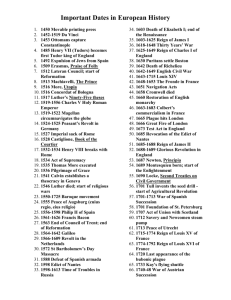Diapositiva 1
advertisement
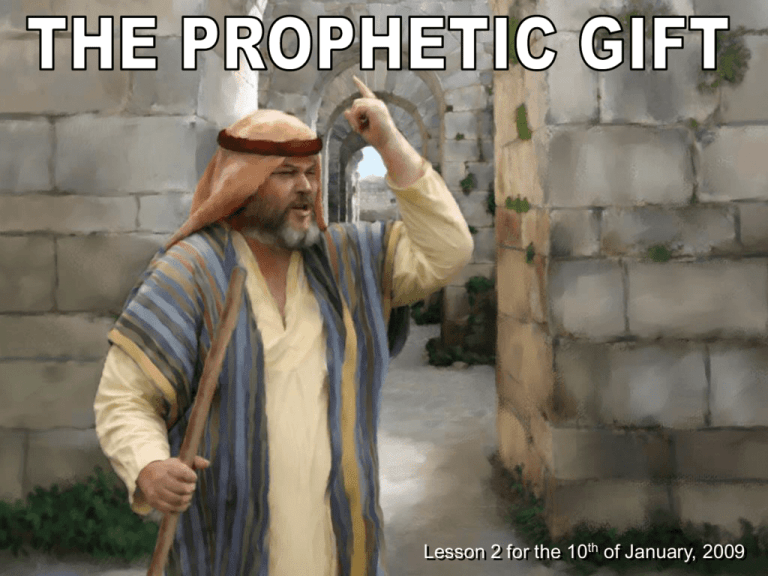
Lesson 2 for the 10th of January, 2009 “From the beginning the church of God has had the gift of prophecy in her midst as a living voice to counsel, admonish, and instruct”. E.G.W. (Selected Messages, Book 3; page 83) Enoch: “See, the Lord is coming with thousands upon thousands of his holy ones” (Jude, 14-15) Lamech: “He will comfort us in the labour and painful toil of our hands caused by the ground the Lord has cursed” (Genesis, 5:29) Noah: “I am going to put an end to all people, for the earth is filled with violence because of them. I am surely going to destroy both them and the earth” (Genesis, 6: 13) Abraham: He’s the first person who was called prophet (Genesis, 20: 7) He was called friend of God (2 Chronicles, 20: 7; Isaiah, 41: 8; James, 2: 23) Future events were revealed to him (Genesis, 15: 13) Joseph: He had dreams directly from God and he received the gift of dream interpretation. He was prophet before the Pharaoh, interpreting his dream (Genesis, 37: 5-10; 41: 1-36) Mariah:She was a prophetess with the music gift. “Then Miriam the prophetess, Aaron's sister, took a tambourine in her hand, and all the women followed her, with tambourines and dancing” (Exodus, 15: 20) Moses: “Since then, no prophet has risen in Israel like Moses, whom the Lord knew face to face” (Deuteronomy, 34: 10). Moses was the greatest prophet in the old pact and he was a reference to all the prophets who came after him. “The Lord your God will raise up for you a prophet like me from among your own brothers. You must listen to him” (Deuteronomy, 18: 15) Balaam: At first, he was a prophet of God, but he renounced Him. His prophecy about the “Star of Jacob” guided the wise men from the east to Jesus (Numbers, 22: 8; 24: 17) Deborah: Great prophetess, she was called mother in Israel. “Deborah, a prophetess, the wife of Lappidoth, was leading Israel at that time” (Judges, 4: 4) Samuel: “The Lord continued to appear at Shiloh, and there he revealed himself to Samuel through his word” (1 Samuel, 3: 21) Saul: “And he stripped off his clothes also, and prophesied before Samuel in like manner, and lay down naked all that day and all that night. Wherefore they say, Is Saul also among the prophets?” (1 Samuel, 19: 23-24). Despite he cannot be considered like a prophet, he received twice the prophetic gift (1 Samuel, 10: 10-13) David: “The sweet psalmist of Israel” (2 Samuel, 23: 1, 2) was inspired by God to compose a huge amount of Psalms; we can find messianic prophecies among them (Acts, 2: 30) Solomon:God inspired him to write three books which are plenty of wisdom: Proverbs, Ecclesiastes and the Song of Solomon. Gad: David’s personal prophet, he went with David since he was pursued by Saul. He is considered like co-writer of Samuel books (1 Samuel, 22: 5) Nathan: David’s personal friend. He was David’s and Solomon’s adviser, and he helped organizing the music in the temple (2 Samuel, 12: 1-14; 1 Kings, 1: 22; 2 Chronicles, 29: 25) Ahijah: He prophesied the kingdom’s division in the time of Jeroboam (1 Kings, 11: 29) and he Jeroboam consulted him (1 Kings, 14: 2) Jehu: He prophesied during Baasha’s reign (1 Kings, 16: 1-4; 2 Chronicles, 19: 2; 20: 34) Elijah: He prophesied during Acab’s, Ahaziah’s and Joram’s reign. He provoked a great spiritual reform in the kingdom of Israel and he reconstructed the schools of prophets established by Samuel. Micaiah: He prophesied during Acab’s reign. He went to jail because of his prophetic ministry (1 Kings, 22) Elisha: He prophesied during Joram’s, Jehu’s, Jehoahaz’s and Joash’s reign. He was a rich man (1 Kings, 19: 19). He was an acclaimed prophet who asked for a double portion of Elijah’s spirit. He had a huge political influence and his miracles beat Elijah’s ones. Jonah: He prophesied during Joash’s and Jeroboam II’s reign. He was a successful prophet. Amos: He prophesied during Jeroboam II’s reign. He was shepherd and harvester of wild sycamores. He was from Judah, and he was called to prophesy in the kingdom of Israel. Hosea: He prophesied during the reign of 6 kings, from Jeroboam II until the kingdom’s deportation. He was an educated person. Oded: He prophesied during Pekah’s reign. He made the king to free the captives from Judah he had captured (2 Chronicles, 28: 9) Shemaiah and Iddo: They prophesied during Solomon’s, Rehoboam’s and Abijah’s reign. Iddo is called seer and prophet. They were chroniclers of the Kingdom (2 Chronicles, 9: 29; 12: 15; 13: 22) Isaiah: He prophesied during Uzziah’s, Jotham’s, Ahaz’s, Hezequiah’s and Manasseh’s reign. He was related to royalty and he married a prophetess. He accepted his prophetic ministry with these words: “Here am I. Send me” (Isaiah, 6: 8) Micah: He prophesied during Jotham’s, Nahum: He prophesied Ahaz’s and Hezequiah’s reign. during He was descended from a Amon’s reign. humble rural family. Habakkuk, Zephaniah and Joel: They prophesied during Josiah’s reign. Zephaniah was from royalty. Jeremiah: He prophesied during Josiah’s, Jehoahaz’s, Jehoiakim’s, Jehoiachin’s and Zedekiah’s reign. He was a priest. He was called to prophesy when he was young, so he devoted 40 years to this ministry. He was accused of treason, being imprisoned and thrown to a cistern. He wanted to stop prophesying sometimes, but he felt like “a burning fire” in his heart that encouraged him to continue prophesying (Jeremiah, 20: 9) Huldah: She was prophetess during Josiah’s reign. She was consulted by the king about the book of the Law that was found in the temple (2 Kings, 22: 14-20; 2 Chronicles, 34: 22-28) Obadiah: He prophesied during Zedekiah’s reign. Ezekiel: He was a priest. He was brought up in Jerusalem and he was deported to Babylon in Jehoiakim’s time, where he lived for the rest of his life. He began his prophetic ministry when he was 30, just when he had to begin his priestly ministry. His wife died when Nebuchadnezzar captured Jerusalem, but God banned him from being in mourning. Daniel: He was from royalty; he was deported when he was young and he was a great light in Babylon and in Medo-Persia, where he had political positions. He influenced Cyrus to order the return from captivity. Haggai y Zechariah: They encouraged the people to rebuild the temple in Zorobabel’s time. Malachi: He prophesied in the interval between the two terms of office of Nehemiah, while he was with Artaxerxes. He is the last prophet in the Old Testament. “Although not one of the prophets had a higher mission or greater work to perform than had John, yet he was not to see even the result of his own mission. He was not privileged to be with Christ and witness the divine power attending the greater light, which was manifested in the recovery of health to the sick, of sight to the blind, of hearing to the deaf. He did not see the light which shone through every word of Christ, reflecting glory upon the promises in prophecy. The world was illuminated with pure light from the brightness of the Father's glory in the person of his Son; but John was denied the privilege of seeing the display of wisdom and power of God in the unsearchable riches of the knowledge of Christ. Those who were privileged with being with Christ when he walked a man among men, and listened to his divine teachings under a variety of circumstances while preaching in the temple--walking in the streets, teaching the multitudes by the way side, and in the open air by the sea-side, and while an invited guest seated at the table, ever giving words of instruction to meet the cases of all who needed his help; healing, comforting, and reproving, as circumstances required--were more exalted than John the Baptist” E.G.W. (Review and Herald, April 8, 1873) The prophetic gift continued in the New Testament with these prophets: Zacharias (Luke, 1: 67) and his son John the Baptist (John, 1: 6-7) Simeon and Anna. They were elderly prophets who had the privilege of seeing Jesus on his presentation day(Luke, 2: 25-38) Agabus. He predicted a big hunger in Claudius’ time (Acts, 11: 27-28) Barnabas, Simeon that was called Niger, Lucius of Cyrene, Manaen which had been brought up with Herod the tetrarch, and Saul. Prophets and teachers at Antioch (Acts, 13: 1) Philip’s daughters (Acts, 21: 8-9) John. Apostle and prophet, he is the last canonical prophet (Revelation, 1: 1) All these prophets were common men as we are, with faults and virtues. They longed to serve God and to be close to Him. They received messages and they were ready to transmit them to the people. Despite this could lead them to prison or to death, they “let none of His words fall to the ground” (1 Samuel, 3: 19) “And afterward, I will pour out my Spirit on all people. Your sons and daughters will prophesy, your old men will dream dreams, your young men will see visions” (Joel, 2: 28 NVI) Hebrews, 4: 7
